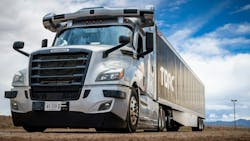Torc autonomous trucking technology reaches another milestone
Torc Robotics’ autonomous truck technology is meeting advanced validation trials using the new generation of Freightliner Cascadias on multi-lane closed courses, the Daimler Truck subsidiary reported this week. The self-driving company is talking with fleets about implementing its technology into the supply chain this decade.
Torc’s driverless semi-truck acceptance tests were conducted at speeds up to 65 mph as the company appears on track to commercialize its autonomous on-highway freight transportation product for fleets by 2027.
“Torc is currently working with our Torc Autonomous Advisory Council and our pilot customers to further understand and refine the overall total cost of ownership in real-world operations,” CJ King, Torc’s chief technology officer, told FleetOwner. “We will continue to share meaningful implementation data through 2025.”
Torc used Daimler Truck North America’s new Fifth Generation Freightliner Cascadia equipped with its AV technology for the trials. King said the test semis include “fully redundant chassis and production intent compute platform and sensor suite.”
See also: Five technology trends driving vehicle mapping and navigation
Torc’s commercialization plan for 2027, announced in 2023, has three principles:
- Economic viability: The company will focus on developing an economically viable product for customers. This will involve understanding the entire value chain of the freight industry, not just the value chain of the truck going down the road.
- Scalability: The company’s product must be scalable for various trucking routes. This will involve recognizing that few fleets in the freight industry operate the same way.
- Safety: Safety is an absolute necessity in this industry. The company will work to build and sustain trust with regulatory bodies and the public.
The milestone announced this week signals Torc’s entry into a scalable product release. The transportation technology company’s artificial intelligence, system architecture, production-intent embedded hardware, and safety engineering are shaping the fleet product that prioritizes genuine software best practices and safer roadways for all, the company noted in a news release.
“Artificial intelligence has undoubtedly been the biggest buzzword of the year, but real-world uses are few and far between,” King said. “Autonomous trucking is one of the most concrete applications for AI that can drive demonstrated revenue, business value, and industry transformation—and Torc is at the forefront of creating a safe autonomous solution with scalability and profitability top of mind.”
King said the Torc AV product will drive “the future of freight,” which exemplifies the Virginia-based company’s commitment to rigorous safety and maturity standards, marking a critical step from advanced engineering and development to full productization on a unified, embedded platform.
Torc CEO Peter Vaughan Schmidt called the product validation “a key moment in our mission.” He said the company is “unlocking the full value of autonomous driving software for customers who prioritize safety, operations costs, ease of use, and reliability.”
Future fleet freight movement
King told FleetOwner that it’s not too early for potential fleet customers to begin talking with Torc and learning more about the autonomous trucking industry.
“We’re looking at all elements of adopting autonomous trucking, including workforce uptraining opportunities—Torc is currently conducting research in this area—and other opportunities to boost operations,” King said.
The company is developing new features and “operational design domain ranges while continuing to safely progress public road testing, including driver-in operations, as we build the safety artifacts for product release,” King explained. “We will continue to exercise progressive features and scenarios with driver-out on a closed course through our product acceptance in 2026.”
See also: How AI can reveal more about your fleet’s fuel efficiency than raw mpg data
Last fall, Torc Robotics announced its plans to commercialize its self-driving technology by offering Freightliner customers the option to spec the Level 4 autonomous capabilities on new Cascadias in 2027.
“There’s the autonomous truck part of this, but it takes a much broader ecosystem—all across the fleet to make sure this is actually a valuable part of the supply chain,” Andrew Culhane, Torc’s chief strategy officer, told FleetOwner during a visit to the company’s Albuquerque, New Mexico, testing center in late 2023.
While the AV trucks would operate on the middle mile—divided highways that link carrier distribution centers—Torc is developing how to integrate its robotic trucks with fleets’ transportation management systems, planners, dispatchers, depot operations, and more.
About the Author
Josh Fisher
Editor-in-Chief
Editor-in-Chief Josh Fisher has been with FleetOwner since 2017. He covers everything from modern fleet management to operational efficiency, artificial intelligence, autonomous trucking, alternative fuels and powertrains, regulations, and emerging transportation technology. Based in Maryland, he writes the Lane Shift Ahead column about the changing North American transportation landscape.

